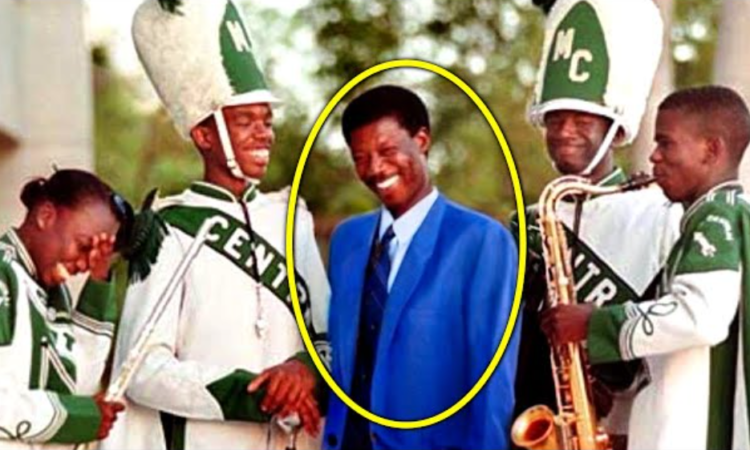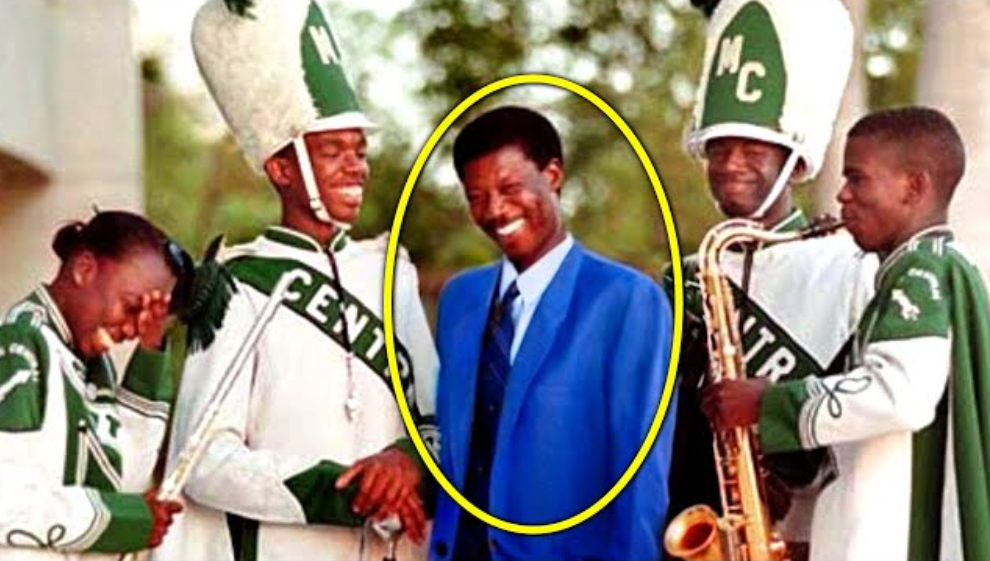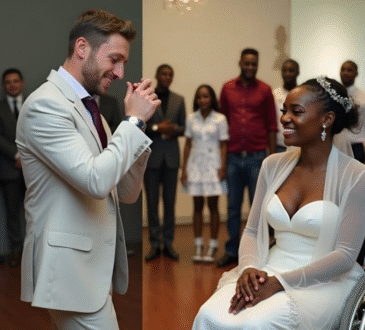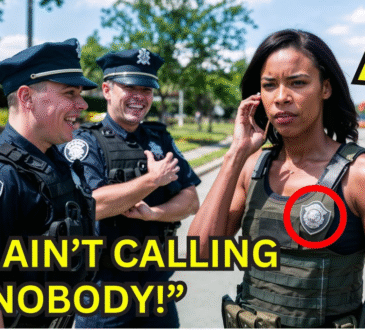
A black man stole $242 million from a bank in Dubai. You won’t believe what happened to him.
In 1995, a black man walked into a Dubai Bank. The scorching sun outside was very different from the cool air conditioning inside the Dubai Islamic Bank. The black man was Fanga Babani Soko, and he rode in with a big smile on his face.

What he came for was simple: he claimed he needed a car loan. Little did the bank manager suspect, Fanga would use this ordinary request to steal $242 million and cause huge problems for him and the bank.
Muhammad Aud was the bank manager, and he was a Muslim like Fanga. Muhammad found himself drawn to Fanga’s easy charm and smooth talk. As the two men discussed the car loan over steaming cups of strong Arabic coffee, Fanga entertained Muhammad with stories of his adventurous life back in Mali.
As the conversation flowed, Fanga casually dropped a bombshell: he claimed he possessed the power of black magic, and thus he could double any amount of money. Most people, especially Westerners, see black magic or voodoo as an African thing, but in the Middle East, such practices are a lot more familiar.
Muhammad was raised in a culture where belief in supernatural beings like jinn was common, so he felt curious when Fanga talked about magic. Despite Islam’s disapproval of such practices, the possibility of doubling the bank’s money was too strong for Muhammad. Yet, he had to be careful.
But Fanga was smarter. He sensed that Muhammad was curious but not fully convinced, so he pressed his advantage. Fanga invited the manager to witness a private demonstration where he could see money double with his own eyes.
Muhammad felt excited at this prospect, so he agreed. After some persuasion, a few days later, the men met at a secluded location, and Muhammad brought some cash to be doubled. Fanga prepared with a theatrical flourish and ushered the bank manager into the dimly lit room.
The air crackled with mystery as Fanga muttered strange words, and the room lights flickered on and off dramatically. Soon, otherworldly noises filled the room as if there were spirits in it. Muhammad was caught up in the performance, and he watched in wide-eyed wonder.
With the black magic trick complete, Fanga produced a wad of cash that was double the amount Muhammad had brought. The bank manager was excited; it was real, he thought. He had found a way to double the money.
As the manager of a bank with millions of dollars, he could make millions in profits. Muhammad rushed back to the bank, fully convinced he’d stumbled upon a golden opportunity. People say greed has no religion, and that was what happened to him.
Muhammad, who was once a cautious manager, was now blinded by the promise of immense wealth. He immediately began transferring money from the bank’s accounts into Fanga’s accounts. He expected Fanga to double the funds and send them back, but Fanga wasn’t really a magician; he was just a sneaky con man who tricked Muhammad.
At first, Fanga had borrowed some money from another bank and used the money to make it look like he doubled what Muhammad had given him. This made Muhammad trust Fanga completely. To make the early transactions appear real, Fanga cleverly used the borrowed funds to double and send back the next three amounts Muhammad wired to his account.
These continued successes further solidified Muhammad’s belief in Fanga’s sorcery. This weird fraudulent scheme continued over the next three years as Muhammad made over 183 transfers into Fanga’s various accounts scattered around the world.
Fanga had completely fooled the bank manager into sending a staggering $242 million of the bank’s money to him. Fanga took all that stolen money from the bank and spent it lavishly. He lived a very expensive life while ignoring Muhammad, who kept asking for the doubled money back.
By the end of 1998, news began to filter that the bank was running out of money, but the bank denied it. Muhammad claimed it was just a little temporary difficulty. He insisted that it did not lead to any financial losses either in the bank’s investments or any depositors’ accounts, but this was not true.
As rumors of the bank’s cash flow problems began to circulate, Muhammad kept denying them. He was afraid for his job and reputation. He had trusted Fanga, and now he had been fooled. But the truth, like a genie out of a bottle, could not be contained forever.
Dubai Islamic Bank was on the brink of collapse because of Fanga’s theft. The bank would have gone into bankruptcy if the government had not stepped in at the last minute and used public funds to save it from a financial disaster. By then, Fanga was long gone.
He had gone from Dubai to New York with a stolen $242 million, leaving Muhammad alone to face the consequences. He used to be a respected bank manager, but now everyone knew he had been tricked by a con man. His career and reputation were in tatters, and he faced the consequences of greed and believing in things that were too good to be true.
The bank asked Alan Fine, a Miami attorney, to investigate the crime. As the investigation was launched, Fanga’s daring plan became clear. He had gotten the money he had used to fake the money doubling from City Bank, just like he had done with the Dubai Islamic Bank.
He had walked into City Bank one day with no appointment and spoke with a bank teller. Within weeks, Fanga had married the teller. Fanga’s new wife made his relationship with the bank more comfortable.
She opened an account for him there, through which Fanga got money for his money-doubling scam. Through this account, more than $100 million of the stolen money was wired/transferred to him.
As he was in the United States, Dubai Islamic Bank, or DIB for short, would later bring a case against City Bank. The bank claimed that more than $151 million was debited by City Bank from DIB’s correspondent account without proper authorization. But the case went nowhere.
Fanga, with pockets overflowing with stolen cash, had transformed himself overnight. He was no longer the unknown man who had walked into the Dubai Bank years ago; now, he was a rich and flashy entrepreneur who threw money around like paper.
His wealth and his spending naturally attracted a lot of women to him. Some were attracted by his charm, while others saw him as a chance to live a luxurious lifestyle. And Fanga wasn’t picky at all; he built a harem of wives and girlfriends, and every now and then, a new woman was added to the entourage.
Fanga built a reputation for having a large group of admirers, almost like having a king with his court. But unlike a king interested in power or land, Fanga’s real passion wasn’t women; his eyes were not fixed on female bodies but bodies flying in the open sky.
With the bank’s money flowing freely, Fanga decided to make his lifelong dream come true. He had always dreamt of owning an airline, and he saw it as a way to connect his home country of Mali to the world.
He named the airline Air Deia
, after his hometown back in Mali. And Air Deia was not intended to be subtle; it was going to be loud, colorful, and just as extravagant as Fanga himself. With a flashy name and seemingly endless funds to spare, Fanga set about building his airline.
He began by hiring a flying instructor named Rene Duas as the airline manager. After meeting Duas for the first time in New York, Fanga showered them with expensive gifts to secure his loyalty. Fanga hired people left and right and reigned lavish gifts on them just like he did with women in his life.
News of the new airline spread quickly, and Fanga enjoyed the attention. However, Fanga’s lavish spending couldn’t stay hidden forever. People started noticing the man who appeared out of nowhere and was throwing a lot of money around.
This unwanted attention wasn’t good for business, especially for an airline that needed a legitimate image. But Fanga did not let that stop him. To get his airline off the ground, he needed airplanes.
Fanga set his sights on helicopters, powerful machines that would add a touch of prestige to Air Deia. He sent two Air Deia employees, Serge King and Mounir Dundi, to Miami with a simple mission: they were to buy the helicopters no matter the cost and get them back to Africa as fast as possible.
Fanga believed that money could solve any problem, and he was ready to spend it. The two employees, along with some of his stolen millions, landed in Miami with a single thought: get those helicopters.
They found the seller willing to part with two Bell Huey helicopters, and the price tag was a whopping $135,000 each. But these amounts were drop in the bucket for Fanga’s seemingly endless supply of cash.
Buying them was easy, but getting them out was not. To export such aircraft, special permits were required. This was because these were not ordinary helicopters; they were powerful military-grade aircraft that were built for tough situations.
Because they could be easily refitted as military gunships, it was necessary to obtain a special export license. But this was a tedious process that took time. Fanga was impatient, as he was not one for bureaucratic hurdles.
Being accustomed to a world where money could solve most problems, he believed shortcuts were acceptable. So he decided to take a shortcut: a bribe. He instructed his employees to bypass the process and secure the helicopters quickly.
Fueled by Fanga’s urgency, Serge and Mounir acted like characters from a badly acted movie. They were in a rush to get the helicopters out of the country as quickly as possible. Worst of all, as they looked for a cargo plane to fly the helicopters out, they talked loudly and boasted about overthrowing governments in Africa.
These careless statements only made people around them suspicious. Their suspicious behavior caught the attention of US Customs officials. Customs agents kept a close eye on them, waiting for a misstep.
The misstep came soon enough. Serge and Mounir ignored all warnings and loaded the helicopters onto a cargo plane without the proper paperwork. It was a desperate move, and it backfired spectacularly.
The US Customs officials raided the cargo plane and seized the helicopters before the cargo plane could take off. From there, the situation quickly went from bad to worse. Mounir, in a desperate attempt to get the cargo back, made a foolish attempt to bribe a customs agent.
He promised the agent a free vacation at Fanga’s resort in Gambia in exchange for releasing the helicopters. Little did he know that the customs agents were recording the conversation. Days later, three Air Deia employees, including Serge and Mounir, met with the agent in Miami to deliver the part of the bribe they had promised.
Fanga, who was always careful to keep his distance from illegal activity, claimed the money was a mere gift. It backfired, and the employees were arrested. This attempt to influence an official only deepened the trouble Fanga was in.
News of the seized helicopters and the attempted bribe reached Fanga while he was in Switzerland. He was planning a fancy dinner party with none other than President Bill Clinton. Fanga was hoping to use the dinner to further his image as a successful businessman, while the president’s party was hoping for a donation.
But fate had other plans. Interpol, the international police organization, caught wind of Fanga’s activities and issued an arrest warrant. Fanga was now a fugitive, and his dream of rubbing shoulders with the powerful was shattered.
He fought his extradition for two months, hoping to avoid facing the consequences of his actions, but justice prevailed. Fanga was eventually sent to the US to face charges for crimes. His dream of Air Deia quickly turned into a nightmare.
The airline that was built on stolen money and shady deals could not survive without its crooked leader. Fanga’s fall from grace took his airline down with him, leaving behind unpaid bills and frustrated employees.
The airline’s only large plane was abandoned in New York and scrapped at the airport years later. But Fanga wasn’t one to go down without a fight. After he was extradited to Miami to face the music, he surprised everyone with his next move.
Instead of a public defender, Fanga assembled a powerful legal team, complete with a former US senator. The judge and members of the prosecution were shocked by the number of American diplomats willing to vouch for him.
This power play sent shockwaves through the courtroom and painted Fanga not as a criminal but as a respected businessman with powerful allies. Despite the seriousness of the charges against him, the judge granted Fanga bail on unprecedented terms.
A staggering $20 million was set, and it was the highest bail amount ever witnessed in Miami at the time. Yet, Fanga paid it and walked out of jail. As Fanga waited trial, he was also planning. He understood the power of public perception.
So while his lawyers battled in the courtroom, Fanga was waging a different kind of war: a PR war. Miami streets became his battleground, and money was his weapon. He showered his defense team with expensive cars like Mercedes-Benzes and Jaguars.
He visited the jewelry stores, and a single visit could reportedly cost upwards of half a million dollars. But cars and jewels weren’t enough; he added more wives to his collection, expanding his harem to include Miami’s finest.
But it wasn’t all about pleasure. Fanga was a strategist, and he knew that generosity could be just as powerful as extravagance. He knew that if he could portray himself as a generous and kind man, it might soften the image of a cunning criminal.
So when a local high school band desperately needed funds to travel to a Thanksgiving Parade, Fanga stepped forward. He offered the kids a staggering $400,000. This act of charity landed him positive
press, and the news painted him as a man with a heart of gold.
Newspapers and TV stations took notice of Fanga’s spending spree and kept praising him. The Miami Herald estimated that his generosity exceeded $14 million. This carefully packaged image of wealth, philanthropy, and powerful connections worked its magic.
The public was bombarded with positive stories, and they began to see Fanga not as a criminal but as a misunderstood businessman with a surprisingly generous side.
The legal strategy was similar to Fanga’s public relations campaign. Instead of fighting all charges, Fanga’s lawyers negotiated a plea bargain. He pleaded guilty to a single lesser charge of paying an illegal gratuity.
The strategic move minimized the damage and portrayed him not as a mastermind thief but as someone who made some mistakes. And it worked. The judge sentenced Fanga to a mere 43 days in prison and a $250,000 fine.
It seemed like a slap on the wrist, considering the millions he had allegedly stolen. Ironically, the fine was paid with the funds he had stolen from the Dubai Islamic Bank. Even his prison sentence was cut short.
Fanga secured his early release by paying an additional $1 million to a homeless shelter. The remaining portion of his sentence wouldn’t be served behind bars but under house arrest, conveniently back in his home country of Mali.
Fanga returned to Mali a changed man, at least in appearance. But the public perception he’d cultivated in Miami had spread worldwide. News of his unfair treatment in the US had traveled far and wide.
Instead of facing judgment at home, Fanga was hailed as a hero. He was a sharp and successful businessman who had outsmarted the American legal system.
The truth, however, was that millions stolen from the Dubai Islamic Bank were never recovered. Fanga, the man who walked into a bank for a car loan and walked out with a stolen fortune, had gotten away with it.
Fanga was a free man, but his troubles were far from over. He might have been out of jail in the US, but house arrest in Mali wasn’t exactly freedom. Plus, he was wanted in many countries, and there were still arrest warrants for him all over the place.
More importantly, the Dubai Islamic Bank, the one he stole $242 million from, wouldn’t give up on getting him. But Fanga was a cunning trickster, and he had another plan.
He decided to run for political office, and guess what? He won. As a member of Mali’s parliament, he was basically part of the government. This gave him special power: immunity from prosecution by foreign countries.
So Dubai could chase him all they wanted, but they couldn’t touch him. Meanwhile, back in Dubai, things weren’t so good for the bank manager who had fallen for Fanga’s black magic story.
With Fanga safely hidden behind his legal shield, the blame fell solely on Muhammad. After Fanga stopped answering his calls, Muhammad confessed to a colleague who asked how much was missing.
Muhammad was so ashamed to say the amount that he wrote it on a scrap of paper: 890 million hams, the equivalent of $442 million. Muhammad was convicted of fraud and sentenced to three years in jail.
Fanga, on the other hand, was living freely in Mali. A court in Dubai did sentence him to three years for money laundering, but he never served a day of that time.
Fanga’s time in parliament lasted 12 years, from 2002 to 2014. All those years, he was untouchable. One thing that definitely helped him was the fact that Mali didn’t have extradition treaties with many countries, including Dubai and the US.
This meant they couldn’t force Mali to send him back to face charges. The Dubai Bank kept trying to get their money back through the courts, but as the years passed, it seemed like a lost cause.
Over the years, as Fanga got older, he tried to convince everyone that he was innocent, claiming that he never stole any money. But people weren’t buying it. Some even believed the old black magic story and thought he needed an exorcism to cleanse himself.
Yet despite his claims of innocence, Fanga continued to spend money like crazy. He showered his friends and family with gifts and even added more wives to his collection.
After leaving the government, Fanga tried to build a large hotel in Mali’s capital, but his financial and legal troubles made it impossible to complete. Soon, he suddenly faded out of the public eye.
Years passed, and people began to wonder where he had disappeared. Eventually, Fanga was found in his hometown of Deia. He was an old man now, 70 years old, and not nearly as wealthy as he used to be.
Though he was still a free man, he wasn’t exactly living the high life anymore. The stolen millions had slowly run out, and his wives and concubines had left him. By the time he died in 2021, Fanga was a poor man.
Fanga’s life was a puzzle: was he a clever criminal who outsmarted everyone, or a Robin Hood figure who took from rich banks and gave to himself, and maybe some people around him? Maybe the answer to the question died with him.




